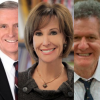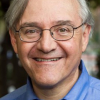Each time a man stands up for an ideal, or acts to improve the lot of others, or strikes out against injustice, he sends forth a tiny ripple of hope, and crossing each other from a million different centers of energy and daring those ripples build a current which can sweep down the mightiest walls of oppression and resistance.
-- Robert F. Kennedy
Capetown, South Africa
6 June 1966
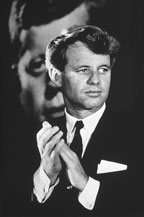 This is a column I didn’t want to write, not wishing to relive the searing memories of 40 years ago when Bobby Kennedy lay mortally wounded on the kitchen floor of the Ambassador Hotel in Los Angeles. But Robert F. Kennedy in life and in death changed my life, so that is why I write.
This is a column I didn’t want to write, not wishing to relive the searing memories of 40 years ago when Bobby Kennedy lay mortally wounded on the kitchen floor of the Ambassador Hotel in Los Angeles. But Robert F. Kennedy in life and in death changed my life, so that is why I write.
On Saturday, 16 March 1968, Robert F. Kennedy announced he was running for president of the United States. In that speech the senator said:
“I do not run for the presidency merely to oppose any man but to propose new policies. I run because I am convinced that this country is on a perilous course and because I have such strong feelings about what must be done, and I feel that I'm obliged to do all that I can.
“I run to seek new policies - policies to end the bloodshed in Vietnam and in our cities, policies to close the gaps that now exist between black and white, between rich and poor, between young and old, in this country and around the rest of the world.
“I run for the presidency because I want the Democratic Party and the United States of America to stand for hope instead of despair, for reconciliation of men instead of the growing risk of world war.”
Watching on television from my home in Whittier, I knew in the worst way I wanted to be a part of his campaign; I knew it would be a presidential campaign unlike any other – the chance to end the evil of Vietnam; to raise again America’s collective consciousness on issues of social justice; that in Bobby Kennedy we might comprehend the truth of what Camus wrote, “I should like to be able to love my country and still love justice.”
Subsequently I made two phone calls. The first to Jessie Unruh, the powerful speaker of the California State Assembly, and the second to Pierre Salinger, who had served as press secretary to President John F. Kennedy. Unruh’s people assured me they would get it done, but I was dubious (I had been a key aide to Lt. Governor Glen Anderson, who while a fellow Democrat was not always on good terms with Unruh). If it happened, I thought, Salinger, then a vice president with Continental Airlines, was the person most likely to get it done.
A few days later Pierre asked me to come to his home in Beverly Hills. I arrived in the early evening to find him and his wife entertaining Sonny and Cher, but he excused himself and we went into his study to talk about my interest in working for Bobby. When that was done he said he would get back to me.
“I’ll get back to you.” How many times has someone said that to you? How many times has it been said to me? And how many times does it happen? But Pierre not only said it, he meant it.
When he called he said the Kennedy people wanted me to work with peace groups, based upon my involvement with Negotiation Now, a moderate national peace movement to end the war in Vietnam. I told Pierre I would rather do media related work, which had been part of my responsibilities with the Lt. Governor, that I was tired of peace groups (whose cloying habits I found off-putting). A decision was made to accommodate my wish and the campaign sent me to a place I had never been – Omaha, Nebraska.
A Nebraska Beginning
On a Sunday in late March I flew out of LAX on a United flight to Omaha. Upon arrival I went to the Sheraton Fontanelle Hotel. One of the first people I met was Steve Smith, the legendary Kennedy brother-in-law, and overseer of the family’s business interests.
For someone like me, a 33-year old unknown from California, meeting Smith was a big deal – very. Like many others the Kennedys and the magic of Camelot had captivated me. I had read extensively about the family and followed closely on television and radio stories about President Kennedy and his administration. JFK’s presidency created a vitality and an excitement in the country about politics and the possibilities of government (all the more galvanizing after eight years of the torpor of Dwight Eisenhower’s presidency).
Like most Americans, save for the hate mongers fringe, I was devastated by the president’s death; the 1,000 days of his presidency had brought hope and a sense of renewal to the American spirit, but now it was over, ended by his death in Dallas. But five years later I found my sense of hope reborn by Bobby and what forcibly struck me as his moral commitment to politics.
That Sunday afternoon Steve Smith took me into the bedroom of his hotel suite, away from the crowd in the sitting room. He wanted me to know my responsibilities, what was expected of me, whom I would report to, and whom I would go to when money was needed (her name was Helen Abdouch, and she had worked for Bobby at the Justice Department). First meeting or not, Smith had a way of making you feel as though you mattered, while also making clear the campaign needed me to do my job – because in 1968 Nebraska was a key state in the Robert F. Kennedy’s efforts to win the White House.
So that’s how it began.
The Nebraska Campaign
There’s a lot I could write about my experiences over those next two months, so much crammed in so brief a period of time, but this remembrance is intended to be about Bobby and only marginally about me. But that said, the only value I have is to share my impressions – because books and articles about Bobby have poured off the press, written by people who knew him longer and better and were far more significant in his life than me. If in sharing my experiences you get a better sense of who Bobby was I will have had a measure of success. But if you walk away from reading this thinking it’s more about me than him, then I will have most miserably failed.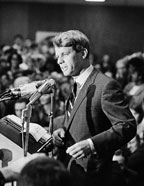
The first time I met Bobby was late on a Friday night at the Hilton Hotel in downtown Denver. He had spent the day campaigning with Caesar Chavez in the hot Central Valley of California before flying east to Colorado. He was leaning against the wall in his suite. He was wearing a blue nightshirt. He looked absolutely beat. Frank Mankiewicz, his press secretary introduced me, but I’m not sure it registered, because Bobby fixed me with a quizzical look of “Who are you?” But Frank told me to pay no attention, that the senator was indeed extremely tired. (Mankiewicz would thereafter become my political mentor in all things media. It was he who first said to me, “If you can’t tell the press the truth then tell them nothing at all.” A charge I have faithfully observed these 40 years.)
The next morning early while the campaign entourage and press waited, Bobby went off for a brisk walk with his dog, a Cocker Spaniel named Freckles. We then went to the Denver airport to board a chartered American Airlines Lockheed Electra; we were bound for Scottsbluff, a small Nebraska town near the Wyoming border.
During the flight I was surprised when one of the senator’s secretaries told me he wanted me to join him for breakfast. No, really, that was a surprise. After all I was just one press aide among many in the campaign. But Bobby wanted to know my “take” on Nebraska, What was going on? How did it look? What were our chances? Sitting opposite of him with a small table between us, between bites of breakfast and sips of coffee, I realized that when he spoke to you, he spoke to you and to no one else. He had an ability to lock in on you, to make you think you just might be the most important person in the world to him. I knew I wasn’t but it made a huge impression on me.
It was an incredible day of campaigning. Starting in Scottsbluff and working our way north and east through one small town after another, and everywhere we went big crowds gathered. Where did they come from, I wondered? It was amazing, because the crowds we saw were bigger than the towns we visited. But it was the lure of Bobby, of the Kennedy magic at work, of the hold the family had on so many in our land. (And, it was also the superb work of the campaign’s advance teams – maybe the best ever.)
That very long, exhausting day ended late at the airport in Norfolk, 112 miles northwest of Omaha. The American charter was waiting to take Bobby home to McLean, Virginia, for he always tried to be home on Sundays with his family. Before boarding the plane people said their goodbyes to the senator. When my turn came I told him to make sure he got some rest. He looked at me and said, “God yes, I need it.” He started up the steps to the plane, but stopped. He came back down and walked over to me. He took my hand and said, “Thank you for today. It was very well done.”
I’ve been around politics and politicians a long time – 42 years and counting. I’ve had my share of memorable moments, but that one moment remains fixed in my memory. Lots of people in the business of politics as in the business of life never take the time to say “thank you”, but that was not who Bobby Kennedy was. It was, to be sure, a small moment, but sometimes in this life character is measured by such small moments; sometimes such acts reveal depths of inner decency and kindness; sometimes they tell you that at a person’s core there is caring and respects for others, no matter how great the relative difference in their positions of power and standing; and sometimes such “small” acts separate the ordinary from the extraordinary – and Robert F. Kennedy was extraordinary.
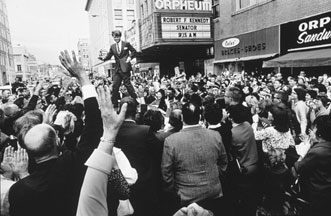 I would thereafter see Bobby a lot, as Nebraska was critical to his chances; but not only Bobby but also his family – his mother, Rose Fitzgerald Kennedy; his wife Ethel; his sisters Eunice Kennedy Shriver and Jean Kennedy Smith, and his sister-in-law, Joan Kennedy. In addition Bobby’s supporters were there in droves – the astronaut John Glenn and his wife, Annie, the actress Marlo Thomas (who became a friend), and a long list of major Democratic politicians, plus others whose names are lost in the fog of memory.
I would thereafter see Bobby a lot, as Nebraska was critical to his chances; but not only Bobby but also his family – his mother, Rose Fitzgerald Kennedy; his wife Ethel; his sisters Eunice Kennedy Shriver and Jean Kennedy Smith, and his sister-in-law, Joan Kennedy. In addition Bobby’s supporters were there in droves – the astronaut John Glenn and his wife, Annie, the actress Marlo Thomas (who became a friend), and a long list of major Democratic politicians, plus others whose names are lost in the fog of memory.
One day we were at Father Flanagan’s Boys Town, a place of legend and redemption. As we were driving away, Bobby was sitting in the back seat of his convertible, which was his want (even after his brother had been killed while also riding in a convertible). Dozens and dozens of young men were running after the campaign caravan as we slowly made our way out of a long circular drive. One of the boys fell. Somehow Bobby saw him fall. He told the driver to stop the car and asked Bill Barry, his one and only security person, to go back and pick up the young lad. Barry did and brought him to Bobby’s car. The boy had sustained a nasty cut on his lip and was bleeding, but Bobby took him into his arms, reached for his handkerchief and wiped the blood from the boy’s face – and then he kissed him on the cheek and hugged him.
Another Long Day of Campaigning
There was another long day of campaigning (a redundancy, they were all long, hard days), this time through the small towns of southeastern Nebraska. At one of the stops along the way, in Beatrice, Bobby went inside a state hospital, a place where hydrocephalitic children were being cared for (children with abnormally large heads). Before he went in, Bill Lawrence of ABC News, asked me if I was coming? I told him I would wait outside, that I wasn’t good in such circumstances. Sometime later Bobby and the press came out of the hospital. What I observed were press members in tears.
I asked Lawrence what had gone on inside? He said Bobby had taken these hydrocephalitic children into his arms, speaking lovingly to them while caressing their foreheads. It was, Lawrence said, an extraordinarily moving moment – and clearly the press was affected by what they saw.
Photo-op moments? No, that’s who Bobby was.
There’s an interesting footnote to this story about the press, how so many of them cared deeply about Bobby, how many of them had fought with their editors to be assigned to the Kennedy campaign (it was more exciting than Eugene McCarthy’s). Bobby paid attention to the press, and not just the big names from networks news or The New York Times or Washington Post. He knew their names; he knew their stories, including camera and sound men (the very people most politicians ignore). Those of us who worked for Bobby understood this phenomenon, and since we weren’t stupid, used it to the senator’s advantage.
There is no better illustration of this, at least in my experience, then what happened later that day when we were done with our swing through southeaster Nebraska. We were at a reception with Eunice Kennedy Shriver at the Cornhusker Hotel in Lincoln, the state capital, and Lawrence, who had been close to President Kennedy, asked me why Bobby didn’t like him? Why he always called him “Mr. Lawrence.” I didn’t think that was true, his being disliked, but I never asked the senator if it were true. But I was amazed that a big time reported like Lawrence, who had covered the White House for The New York Times before joining ABC News, someone at the top of his profession, a journalist held in very high esteem, would even care. But he did, which says a lot about the hold Bobby had on people – not least the press. (Not that it matters, but I loved Bill Lawrence. I thought he was terrific.)
There was another press moment, which reveals a lot about the senator. It was a day that began in Cheyenne and would end much later in Omaha, a 12-stop campaign whistle stop along the Union Pacific’s mainline. A French television crew, fresh from following Pierre Trudeau in Canada, asked me if they could interview Bobby? I went to Fred Dutton, one of the campaign’s key people and told him of the request. He responded angrily, “Bobby Kennedy is not running in France. He’s running in America. We’re not doing the interview!” A person smarter than me would have left it there, as Dutton was not someone to cross. Besides, he was right, there were no votes in France. But me being me I decided to ask the senator himself. I walked back through the swaying passenger cars to the rear of the train, where Bobby and Ethel were having lunch in Averill Harriman’s private railway car (Harriman owned Union Pacific). I told the senator of the French TV crew’s request. He said he would do it – and he did.
Kennedy Humor
There were many serious moments in the campaign, for Bobby was serious and intense, but he also had a wonderful sense of humor (a characteristic of all the Kennedys I’ve known).
It was in marked display one afternoon in the parking lot of a north Omaha shopping center. Bobby was standing on the flat bed of a long trailer, speaking to another huge crowd. A man began to heckle him, loudly and disturbingly so. Several Omaha police officers confronted the man and began walking him to their patrol car. As they did the senator saw what was happening and told the officers to let the man go. “Please officers,” he said, “let the man go.” “No, please, let the man go! He has a right to be heard.” But they didn’t. They placed the man in their patrol car and began to drive away. As they did Bobby yelled, “Sir, I promise you if I’m elected president of the United States my first act will be to get you out of jail!”
I’m running out of space, so let me end by sharing one more story:
On the day after the Nebraska primary, which Bobby won decisively, we made a quick trip to Detroit, where more than a 100,000 people greeted the senator. We flew back west to Los Angeles. When we arrived at LAX, my wife, La Verle, and our three children, Carolyn, Mark, and Tim, were waiting to greet me, as I had not seen them in several months (although the campaign did fly La Verle to Omaha for a weekend).
There was a large crowd waiting to see Bobby in the boarding area (this was before security concerns kept people out of such areas). Some of the staff were pushing Bobby to get off our American charter flight, but I asked if he would say hello to my family? He asked, “Where are they?” “Outside in the terminal”, I answered. He told me to bring them on board. It was obvious some of the staff were annoyed by this delay, but I did as asked. He greeted La Verle, and then asked each of our children their names, ages, and where they went to school? He engaged them in conversation.
Just one more moment in a long campaign day? Perhaps. But it said a lot to me, that no matter how insignificant I was in the grand scheme of his campaign for president, Bobby wanted to meet my family. Those five minutes live on in their memories and in mine; it was special to them and me – and it is one reason among many why we have never forgotten Robert F. Kennedy.
What Might Have Happened
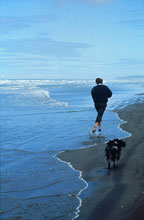 No one can say with certainty what we lost when Bobby died 6 June 1968, but I believe the world would be a vastly different place had he lived – that both America and the world would have been spared so much of the hell the last 40 years has brought. For I am certain Bobby would have been the nominee of the Democratic Party for president, and would have defeated Richard Nixon. Why do I say that? Two reasons: First, because Mayor Daley and his thugs would not have done to Bobby in Chicago what they did to Eugene McCarthy, and, secondly, Hubert Humphrey, with all the baggage of Vietnam and the Johnson presidency, still lost to Nixon by fewer than 500,000 votes.
No one can say with certainty what we lost when Bobby died 6 June 1968, but I believe the world would be a vastly different place had he lived – that both America and the world would have been spared so much of the hell the last 40 years has brought. For I am certain Bobby would have been the nominee of the Democratic Party for president, and would have defeated Richard Nixon. Why do I say that? Two reasons: First, because Mayor Daley and his thugs would not have done to Bobby in Chicago what they did to Eugene McCarthy, and, secondly, Hubert Humphrey, with all the baggage of Vietnam and the Johnson presidency, still lost to Nixon by fewer than 500,000 votes.
Yes, the world would have been a vastly different place.
But if you know anything about the Kennedys, you would know they do not live in the past. As Ethel Kennedy told NBC's Tom Brokaw in an interview 25 years after Bobby’s death, “Kennedys do not do would of, could of, or should of.”
And neither should we.
--This article originally appeared in the Presidio Sentinel, a San Diego-based community newspaper.



